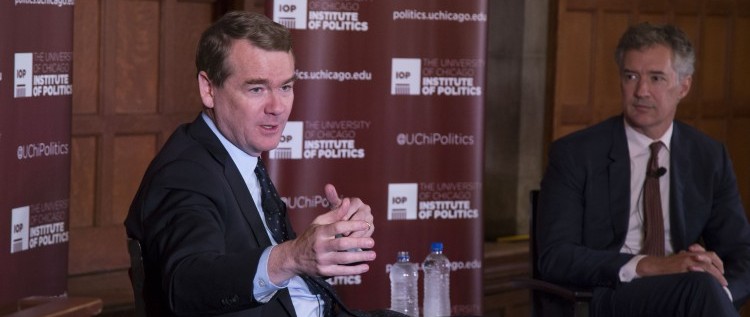Michael Bennet, the Democratic senior senator from Colorado, discussed the possibility of Senate bipartisanship in a fragmented political landscape in a talk at the Quadrangle Club on Thursday.
Bennet explained how political polarization poses a threat to democracy, calling for pragmatic, bipartisan problem-solving in a Senate with an all-time-low approval rating. Political science professor Eric Oliver moderated the event, which was hosted by the Institute of Politics (IOP).
Bennet began by arguing that the democratic system created by America’s founders, whom he called “great geniuses,” is under attack from obsessive party politics.
Without naming them, Bennet criticized fellow senators, who he claimed care about their own party’s interests more than issues like climate, infrastructure, and education. He argued that privileging party interests over everything else leads to the weaponization of debt ceilings and government shutdowns in the Senate. According to Bennet, such partisan practices pose grave challenges to the creed of “majoritarian rule” at the core of the Constitution.
Bennet also argued that the Senate faces the danger of undesirable long-term consequences from breaking norms for the sake of convenience. He described Senate Democrats’ attempt to put Merrick Garland into the Supreme Court as an example. In order to circumvent Republican filibustering, they forced a change to allow confirming a Supreme Court nomination with a simple majority vote of 51–49, rather than a supermajority of 60–40 in normal times. After the Democrats ultimately failed, the same accommodation allowed the Republicans to easily send in Neil Gorsuch.
Bennet also criticized the Supreme Court’s 2010 decision in Citizens United v. FEC, calling the majority opinion written for this case as bad as “a seventh grader’s U.S. history paper.” The decision allows unrestricted donations to super PACs in the name of “freedom of speech.” Bennet argued that this encourages corruption by condoning big money’s manipulation of politics.
Bennet condemned the role of money in politics. He cited the example of an unspecified Republican senator who urged colleagues to hold a hearing for Garland’s confirmation. The senator was intimidated by the Koch Brothers, major conservative political donors, who threatened to spend millions of dollars against his re-election campaign. Ultimately, the senator rescinded his support.
Bennet also attributed current stalemates in tax and immigration reforms to political polarization. “Tax reform is literally the hardest issue in the Senate,” he said, because “so many people in D.C. have an interest in keeping things as it is.” In his view, the only solution to these issues is to leave the Trump administration out of the picture and let the bipartisan Committee on Finance (of which Bennet is a member) figure it out.
When questioned on immigration, Bennet said the fact that Democrats insist on protecting DACA recipients doesn’t imply they are against increased border security. In fact, he said, many Democrats agree there should be more fences and inspectors on the U.S.–Mexico border. He added, however, that since DACA recipients “know no other country than this one” and “are as fully American as anyone else,” opposing their citizenship is equivalent to being anti-American.
Bennet concluded the talk by reiterating his message to fellow senators and citizens to overcome polarized bigotry, talk through disagreements, and get things done.










